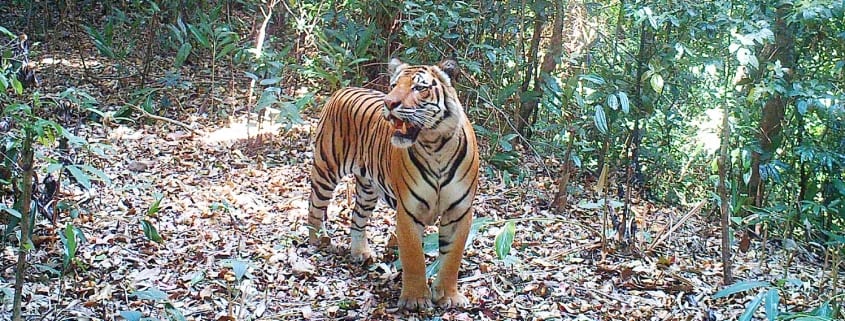Protection for Southeast Asia’s Rarest Wildlife through Community Engagement
On December 19, Rainforest Trust local partner Karen Environmental and Social Action Network (KESAN) announced the declaration of the newly formed Kaydoh Mae Nyaw Wildlife Sanctuary in Myanmar.
Located in Karen State in eastern Myanmar along the Thai border, this newly protected area boasts large swaths of remote pristine forests containing a plethora of species assessed as threatened on IUCN’s Red List. The reserve protects 66,965 acres of subtropical broadleaf forest and provides a safe haven for 64 mammal species such as the Asian Elephant, Tiger, Dhole, Banteng, Phayre’s Leaf-monkey and two species of Pangolin – the Sunda and Chinese – both of which are Critically Endangered. There have also been 122 bird species, 12 amphibian species and 20 reptile species (including the Endangered Big-headed Turtle and the Endangered Elongated Tortoise) recorded in the area.
As the area is little explored, further field studies are sure to reveal new species yet to be described by scientists. Mounting demand for illegal wildlife products has created an increasingly more urgent need to protect these unique and biologically rich forests. Rainforest Trust’s local partner aims to ensure both national and global recognition of their protected areas and wildlife protection strategies through the Karen Wildlife Conservation Initiative (KWCI). The KWCI identified Kaydoh Mae Nyaw as an area urgently needing protection due to the number of high value species in the area.
The new protected area will be managed by the indigenous Karen community, and conservation efforts with KESAN will focus on collaborative management and capacity building in the form of patrolling and law enforcement, protected area infrastructure and awareness programs.
Rainforest Trust has supported community outreach activities with the local Karen community, such as the employment of local villagers to assist in wildlife and forest conservation surveys. Community development and education programs as well as agricultural assistance and alternative livelihood programs ensure ongoing community commitment to conservation. Villagers living within and around the protected area feel a great sense of ownership and buy-in to protect their resources and have even established their own informant network to report illegal hunting.
Dr. George Wallace, Chief Conservation Officer for Rainforest Trust, applauds the community’s role in protecting this key area.
“The indigenous Karen people’s local knowledge and pride of their homeland are key to the success of Kaydoh Mae Nyaw and the preservation of its precious resources.”
Long-term protection efforts will continue to emphasize community integration, further empowering local Karen people as stakeholders in conservation efforts through regular biological monitoring and development programs. By strengthening community-based conservation efforts on Karen lands, one of the most intact and wildlife-rich ecosystems remaining in all of Myanmar and Southeast Asia will receive the protection it so urgently needs.
With the generous support of our friends around the world and the SAVES Challenge, this project is a success. A special thank you to Luanne Lemmer and Eric Veach for their leadership support.
For more information on how you can support Rainforest Trust, visit our Conservation Action Fund.




